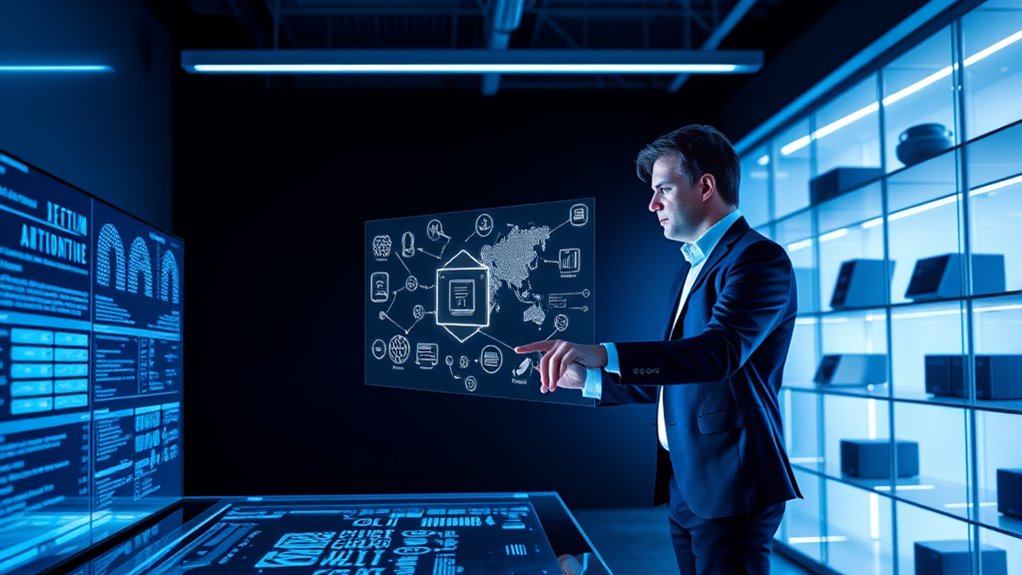AI transforms licensing agreements by automating routine tasks like identifying key clauses, managing document versions, and providing real-time analytics. It speeds up negotiations, reduces errors, and guarantees contracts stay updated with evolving regulations. By standardizing frameworks and offering tools for customization, AI makes licensing more efficient, consistent, and transparent. If you keep exploring, you’ll discover how AI can open even greater efficiencies and improve compliance in your licensing processes.
Key Takeaways
- AI automates routine tasks like clause identification, obligation tracking, and risk assessment to streamline licensing negotiations.
- It supports contract lifecycle management with version control, audit trails, and real-time analytics for performance monitoring.
- AI-driven tools provide standardized licensing frameworks, reducing legal complexity and speeding up agreement drafting.
- Automation enhances accuracy, consistency, and compliance with evolving AI regulations across regions and industries.
- AI clarifies ownership, usage rights, and liability issues for AI models, data, and outputs, addressing unique licensing challenges.

Have you ever wondered how AI is transforming the way licensing agreements are created and managed? It’s revolutionizing the process by introducing automation, precision, and speed, especially in the complex world of AI licensing itself. Unlike traditional software licenses, AI licensing involves unique terms that cover data use, model training, and output ownership. You need to clarify rights related to training data sets, which differ from conventional software licensing that typically focuses on code. These agreements also address ongoing improvements and updates to AI models, reflecting their adaptive nature. Because AI can generate outputs autonomously, ownership and liability for these outputs must be explicitly outlined, reducing ambiguity and legal risks. Additionally, as AI regulation evolves, licensing agreements increasingly incorporate compliance provisions aligned with emerging frameworks, ensuring your contracts stay current and enforceable. Understanding Louisiana Alimony Laws can also be crucial when drafting agreements that involve financial support or obligations related to employment or separation. AI-powered contract lifecycle management tools are transforming how licenses are drafted, reviewed, and monitored. Platforms like Evisort automate many routine tasks, such as identifying key clauses, obligations, and risk factors, thanks to natural language processing technology. This automation reduces human error, shortens negotiation cycles, and accelerates contract execution. These tools also support version control and audit trails, making it easier to track changes and ensure compliance over time. Integration with enterprise systems enables real-time analytics, giving you insights into contract performance and potential risks. This dynamic approach streamlines workflows, saves costs, and improves overall legal oversight.
However, negotiating AI licenses isn’t without challenges. You must carefully address intellectual property rights, not only for the AI models but also for the training data, which might be owned by different parties. Defining permissible uses can be tricky, given AI’s capacity to develop new, unanticipated applications. Liability and indemnification clauses become critical, especially when AI decisions lead to unforeseen outcomes. Transparency and explainability are also essential, both for regulatory compliance and for building trust in AI outputs. Managing license scope across different regions and industries requires precise drafting to prevent overreach or restrictions that could hinder usage.
To simplify these complexities, model licensing frameworks inspired by open-source licenses are gaining popularity. These standardized frameworks help clarify usage rights, reduce negotiation times, and facilitate collaboration. Using uniform licenses for training data and AI tools enhances interoperability and predictability, making legal processes more straightforward. AI licensing agreement generators further streamline the process by guiding you through customizing key terms such as exclusivity, duration, geographic scope, and sublicensing rights. These tools reduce reliance on expensive legal review, speed up negotiations, and ensure your agreements are clear and enforceable. Overall, AI automation in licensing agreements offers efficiency, consistency, and better risk management, transforming how you create, manage, and enforce licensing contracts in the evolving AI landscape.
Frequently Asked Questions
How Does AI Handle Jurisdiction-Specific Licensing Laws?
You might wonder how AI handles jurisdiction-specific licensing laws. It automates compliance by analyzing agreements for legal requirements across regions, generating tailored contracts, and monitoring ongoing adherence. AI tools research local laws, flag issues, and help you adapt agreements quickly as regulations evolve. This active approach reduces manual effort, minimizes errors, and keeps your licensing practices aligned with complex, ever-changing jurisdictional rules.
Can AI Adapt to Real-Time Changes in Licensing Regulations?
You wonder if AI can adapt to real-time licensing regulation changes. With advanced machine learning, natural language processing, and real-time data analysis, AI can quickly interpret updates and modify licensing processes. It integrates with existing systems and uses cloud infrastructure for scalability. However, challenges like complex legal language, data quality, and evolving regulations mean you need ongoing oversight to guarantee AI adapts accurately and ethically to regulatory shifts.
What Are Ai’s Limitations in Interpreting Complex Legal Language?
Like a sailor steering treacherous waters, you face AI’s limits in understanding complex legal language. It struggles with nuance, idioms, and layered meanings, often misinterpreting subtle distinctions. You can’t fully rely on AI for accuracy, especially with ambiguous or conflicting terms. Its lack of human judgment means errors could lead to serious legal issues. You must complement AI with expert oversight to guarantee precise, context-aware interpretation in legal matters.
How Secure Is AI in Protecting Sensitive Licensing Data?
You might wonder how secure AI is in safeguarding sensitive licensing data. While AI systems use encryption, access controls, and data anonymization to protect information, vulnerabilities still exist. Cybersecurity threats, data breaches, and system failures pose risks. To stay safe, you should implement regular monitoring, update systems frequently, and make certain compliance with data protection laws. These measures help guarantee your licensing data remains secure from potential threats.
Will AI Replace Legal Professionals in Licensing Processes?
Imagine a robot trying to replace a skilled lawyer—it’s unlikely to capture your nuanced judgment. The current question asks if AI will replace legal professionals in licensing processes. The answer is no; AI mainly automates routine tasks and enhances efficiency. You’ll still rely on human expertise for complex decisions, ethical considerations, and strategic negotiations, ensuring that your professional judgment remains essential despite technological advances.
Conclusion
You might think AI can’t handle the complexities of licensing agreements, but it actually streamlines the process and reduces errors. By automating routine tasks, AI frees you up to focus on strategic decisions and negotiations. Don’t let fear of automation hold you back—embrace this technology to stay competitive and efficient. With AI, you’ll find licensing faster, smarter, and more reliable, ensuring you’re always a step ahead in your industry.










